If you’re a pet owner like me, you know that fleas can quickly turn your furry friend’s life into a nightmare—and yours, too. While there’s no shortage of chemical flea treatments on the market, many of us worry about exposing our beloved pets to harsh substances that might cause side effects. That’s where natural flea treatments come in as a gentler, safer alternative to keep both your pets and home free of these persistent pests.
In this comprehensive article, I’ll walk you through everything you need to know about natural flea treatments—from understanding the flea lifecycle and the risks fleas pose to your pets, to detailed insights on key natural ingredients and the best natural flea products you can trust. I’ll also share practical tips on managing flea infestations in your home and yard, as well as easy-to-make homemade remedies you can whip up yourself. Whether you have a dog, cat, or both, this guide will equip you with knowledge, proven strategies, and top recommendations to take control of fleas safely and effectively using natural solutions.
Understanding Flea Infestations: Life Cycle and Risks to Pets
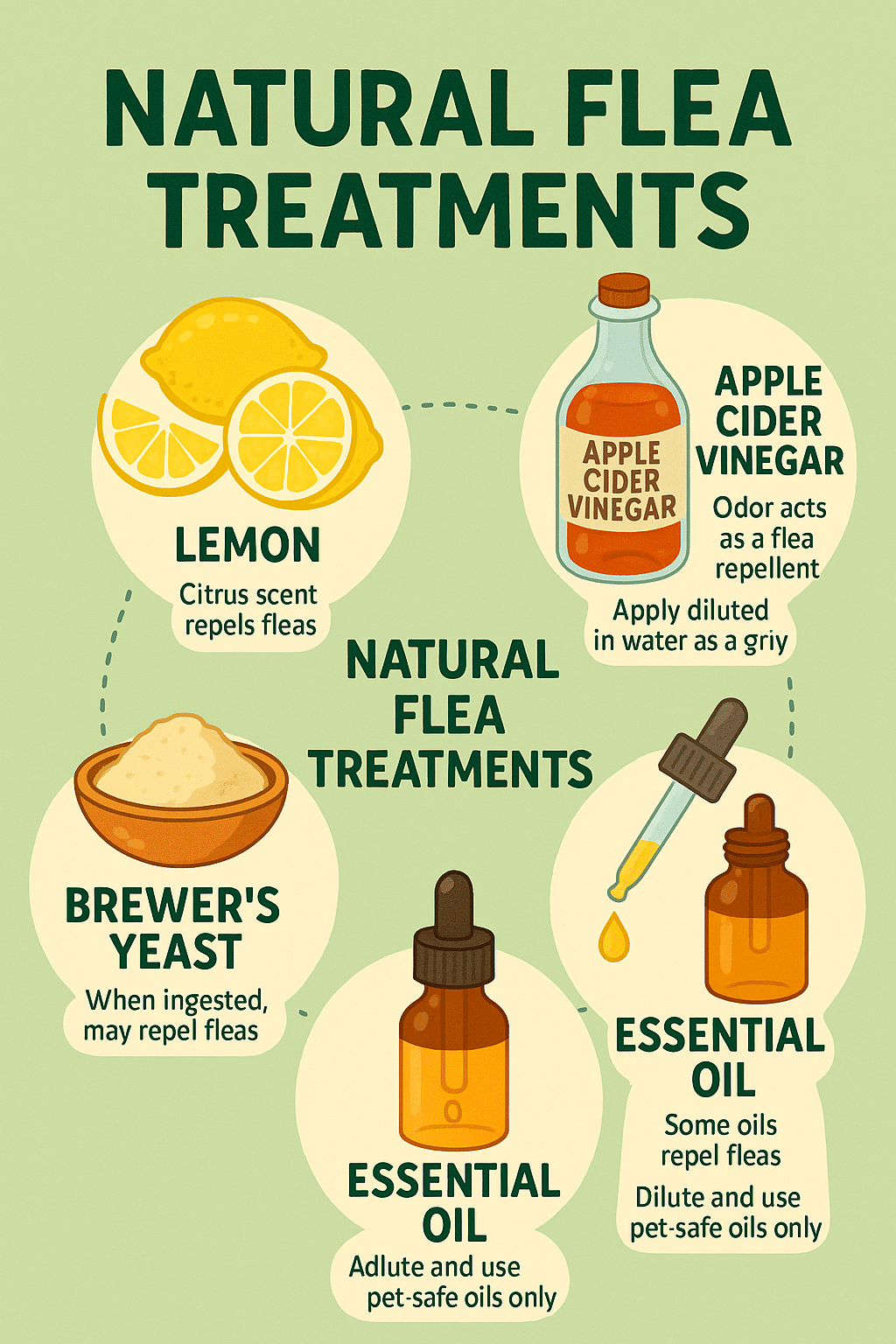
Fleas are tiny, wingless insects, but their impact isn’t small at all. To effectively combat them with natural flea treatments, it’s essential to understand their life cycle and the dangers they pose. Fleas progress through four life stages: egg, larva, pupa, and adult. Adult fleas lay eggs on your pet, but these eggs often fall off into carpets, bedding, and outdoor areas. Eggs hatch into larvae, which feed on organic debris in your environment, then pupate and emerge as adult fleas ready to feed again.
This cycle can take as little as two weeks or stretch to several months based on temperature and humidity. Adult fleas bite your pet to feed on blood, causing intense itching, scratching, and allergic reactions, including flea allergy dermatitis (FAD). Beyond discomfort, heavy infestations can lead to anemia, especially in puppies or older pets. Fleas also transmit diseases such as tapeworms and Bartonella (cat scratch fever).
Another critical point is that treating just the adult fleas on your pet might provide short-term relief, but without disrupting the entire lifecycle—including eggs and larvae—you’ll likely face recurring infestations. That’s why a comprehensive approach targeting all flea stages around your home and yard is necessary. Natural flea treatments offer multi-stage control without introducing harmful chemicals to your pet or environment.
Why Choose Natural Flea Treatments Over Chemicals?
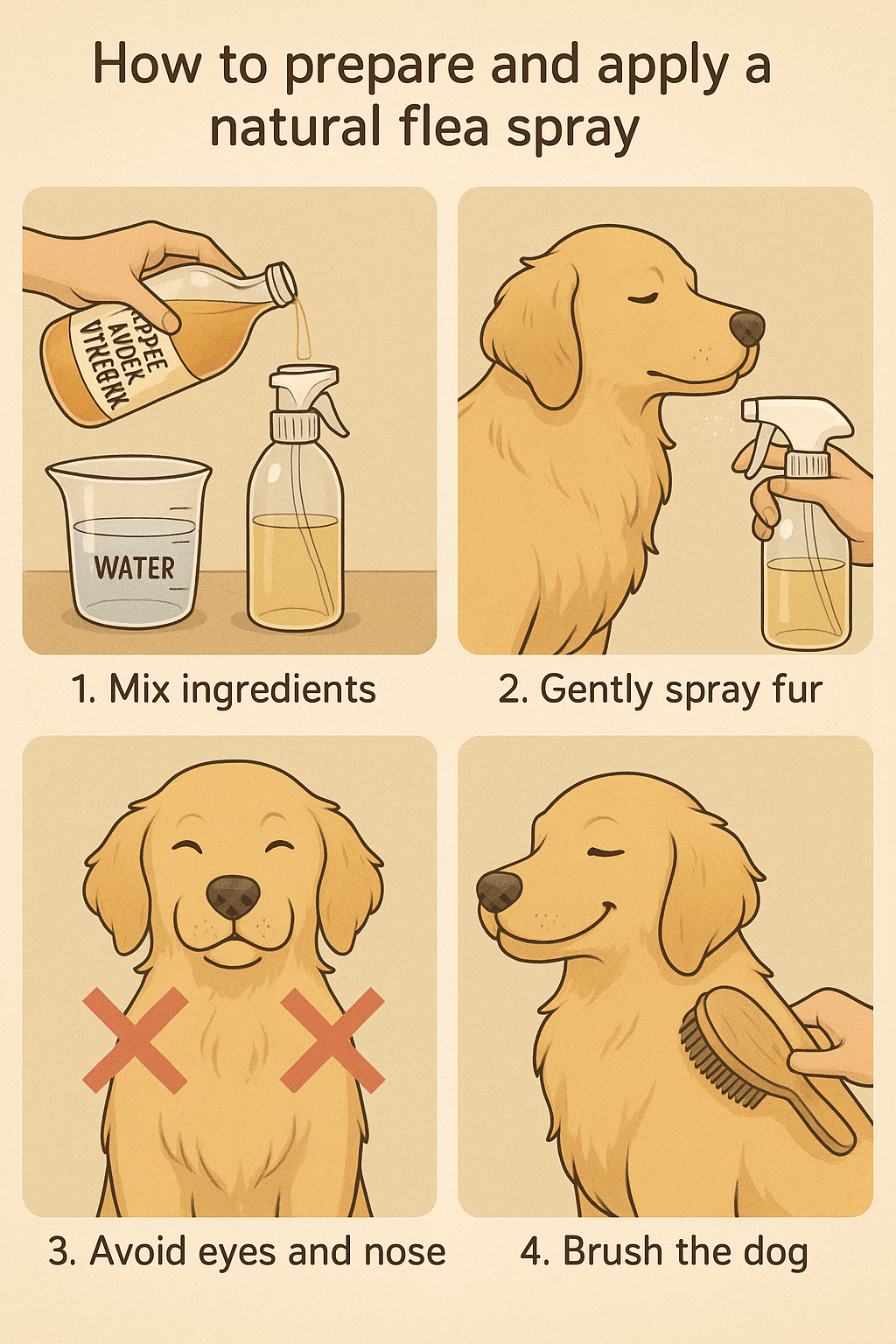
Benefits and Limitations of Natural Remedies
Choosing natural flea treatments comes with a range of advantages that many pet owners, including myself, appreciate. Natural products tend to be:
- Safer for pets and humans: Many chemical treatments can cause adverse reactions, especially in cats, small dogs, or pets with sensitivities. Natural ingredients like essential oils, diatomaceous earth, and herbal extracts provide protection without harmful side effects.
- Environmentally friendly: Natural treatments minimize pollution, avoid harsh toxins, and preserve beneficial insects in your garden and yard.
- Less likely to lead to resistance: Fleas may develop resistance to traditional chemicals over time. Natural products relying on multiple plant compounds reduce this risk.
- Multi-purpose: Natural sprays and powders frequently work on flea eggs, larvae, and adults, plus repelling ticks and mosquitoes.
That said, natural treatments require consistent application and environmental management to be truly effective. Unlike quick chemical kills, natural remedies often work gradually to break the flea lifecycle. It’s important to be patient and persistent. For severe infestations, natural treatments may need to be combined with vet-prescribed options under professional guidance.
Safety Considerations for Different Pets (Dogs vs Cats)
Not all natural flea treatments suit every type of pet. Cats are notoriously sensitive to certain essential oils like tea tree, eucalyptus, and pennyroyal, which can be toxic even when diluted. Therefore, it’s crucial to research products carefully before use and avoid any treatment specifically contraindicated for cats.
Dogs generally tolerate a wider range of natural oils and ingredients, but sensitivity tests should be done regardless. For all pets, spot testing a small skin area before full use helps avoid allergic reactions. I always recommend consulting your vet before switching flea control approaches, especially if your pet has health conditions or is under medication.
Key Natural Ingredients Used in Flea Treatments
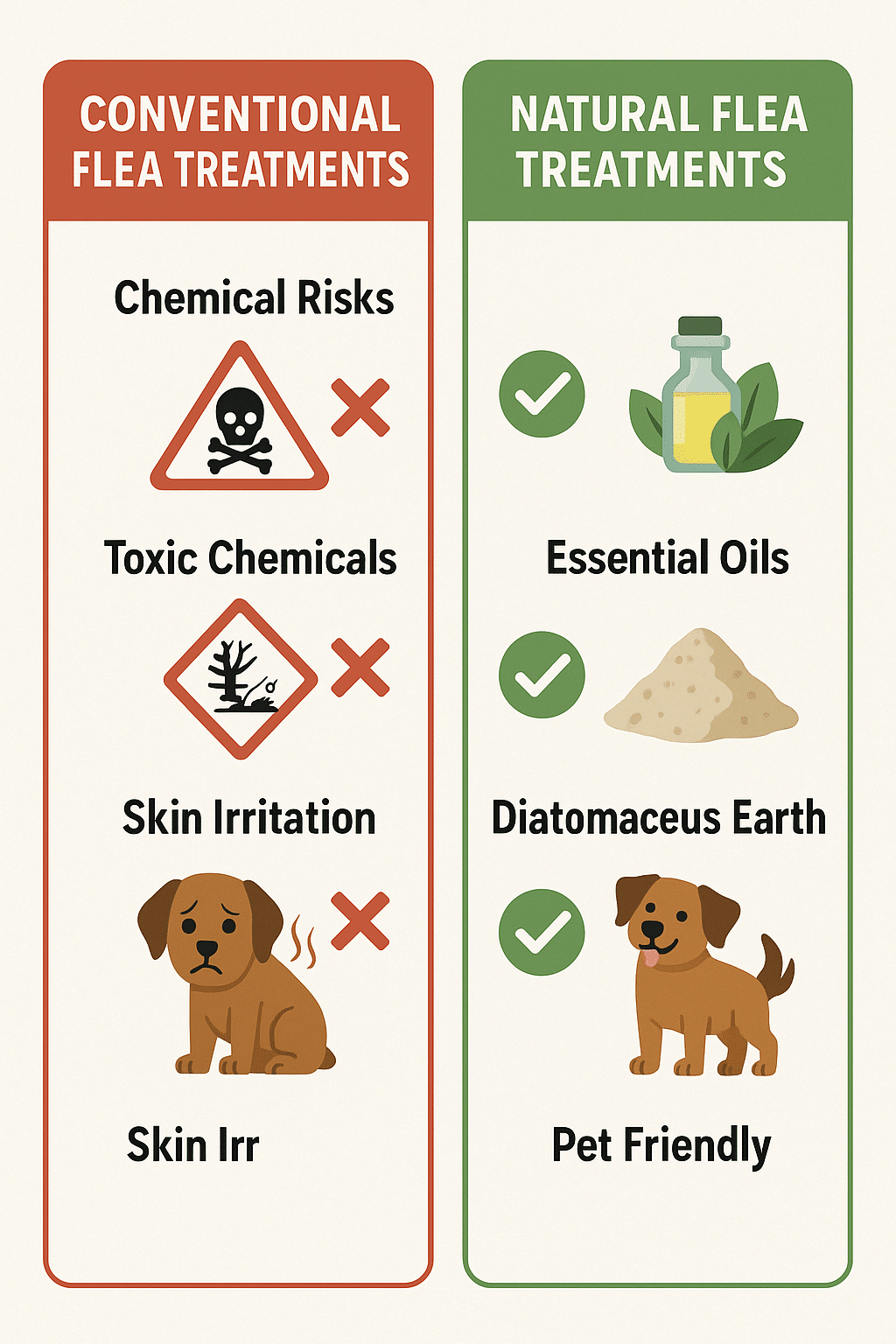
Diatomaceous Earth: How It Works and Application Tips
Diatomaceous Earth (DE) is one of the most effective natural flea killers out there. It’s a fine powder made from fossilized remains of diatoms—a type of algae. The powder’s microscopic, sharp edges pierce the protective outer coating of fleas, dehydrating and killing them without chemicals.
How to use DE safely:
- Choose food-grade diatomaceous earth, such as Harris Diatomaceous Earth, which is safe around pets and people.
- Apply lightly to carpets, pet bedding, furniture, and any areas where fleas hide.
- Avoid inhaling the dust by wearing a mask and ventilate the area well.
- Leave DE for several hours or overnight for best results, then vacuum thoroughly.
- Repeat every few days for ongoing protection.
This approach works well as part of a home flea control strategy alongside flea combing and pet sprays.
Essential Oils Effective for Flea Control and Their Safe Use
Certain essential oils repel and kill fleas naturally by disrupting their nervous system or masking pet scents that fleas use to locate hosts. When properly diluted, these oils are potent and safe.
Some top essential oils with proven flea-fighting properties include:
Cedarwood, Lemongrass, Rosemary, Lavender, Peppermint
- Cedarwood: Has insecticidal properties and a scent fleas hate. It’s commonly used in flea collars and sprays.
- Lemongrass: Contains citronella, a natural insect repellent, effective in deterring fleas and ticks.
- Rosemary: Works as a powerful flea repellent and can soothe pet skin irritation.
- Lavender: Has mild insecticidal effects and a calming scent safe for most pets.
- Peppermint: Repels fleas effectively but should be used sparingly, as it can be potent on sensitive skin.
Safety Notes: Never apply essential oils undiluted directly on pets. Use pet-safe carrier oils or products designed for animal use. Avoid oils like tea tree and eucalyptus around cats. Products like Wondercide Natural Flea & Tick Spray blend these oils safely for direct pet application.
Apple Cider Vinegar and Citrus-Based Treatments
Apple cider vinegar (ACV) and citrus fruits like lemon contain acetic acid and limonene, substances naturally disliked by fleas. ACV can balance the pH of your pet’s skin, deterring flea infestations.
A simple homemade spray mixes water with ACV and lemon juice to spray lightly on your pet’s coat. Avoid eyes and open wounds.
Herbal Flea Repellents and Flea-Repelling Plants for Your Home and Yard
Several herbs and plants naturally repel fleas and other pests when grown around your home:
- Mint: Strong smell masks animal scents.
- Lavender: Repels fleas and adds a fresh aroma.
- Chrysanthemum: Contains pyrethrum, a natural insecticide.
- Rosemary: Doubles as an herb and a flea repellent.
Planting these herbs in your yard or placing dried bundles indoors helps reduce flea presence.
Top 7 Natural Flea Treatment Solutions for Pets and Home
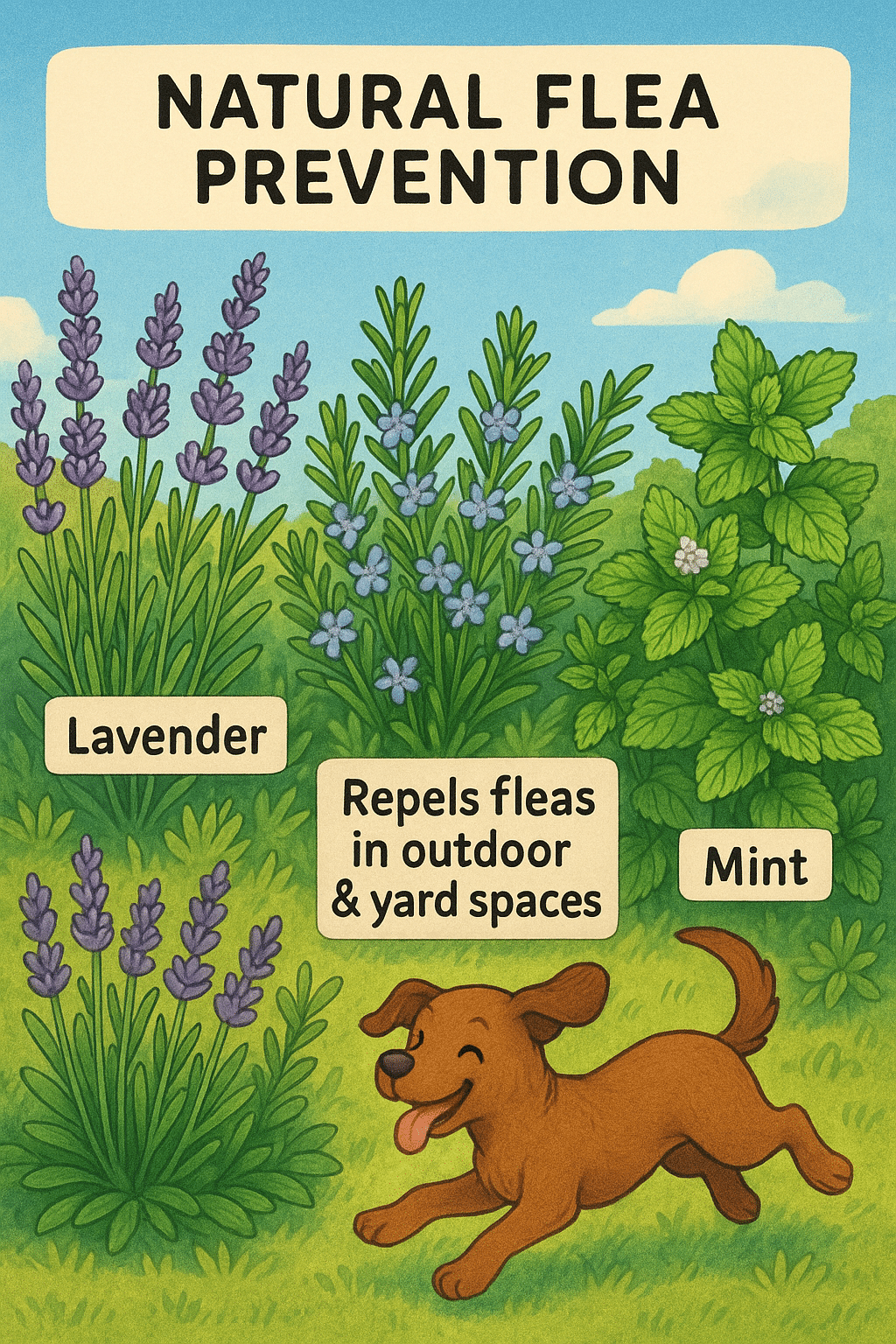
Here’s a rundown of the best natural flea treatment products I’ve tried or reviewed, including where to buy them and detailed usage tips to help you choose what fits your needs.
1. Wondercide Natural Flea & Tick Spray: Multi-Purpose Protection
Wondercide offers a plant-powered flea and tick spray made from steam-distilled essential oils such as cedarwood, lemongrass, and rosemary. Safe for all pet ages, this spray can be used both on pets and in home environments like carpets and bedding.
Features:
- Kills and repels fleas, ticks, and mosquitoes on contact
- Free from artificial dyes and fragrances
- Suitable for dogs and cats
- Easy-to-use spray bottle in handy sizes (4 oz to 16 oz)
Pros: Multi-surface use, pleasant natural scent, effective contact kill
Cons: Requires daily reapplication for continuous protection
Usage Tips: Shake well before use, spray lightly avoiding eyes and mouth, and reapply after swimming or baths.
2. Vet’s Best Flea & Tick Home Spray: Plant-Based Household Solution
Vet’s Best blends peppermint oil and eugenol from clove plants for a natural spray that tackles fleas in the home on furniture, pet bedding, and carpets. It kills fleas, flea eggs, ticks, and mosquitoes by contact.
Features:
- Natural oils safe for dogs over 12 weeks (not for cats)
- Pleasant peppermint scent without synthetic fragrances
- Versatile for indoor and outdoor use
- Breaks flea life cycle stages effectively
Pros: Chemical-free, effective against multiple stages of pests
Cons: Not safe for cats, spot test fabric before use
3. Adams Plus Flea & Tick Shampoo with Precor: Conditioning and Flea Control
Adams Plus flea shampoo incorporates an insect growth regulator called Precor to prevent flea eggs from hatching for 28 days. Enriched with oatmeal, aloe, lanolin, and coconut extract, it gently conditions your pet’s coat while killing fleas and ticks.
Features:
- Kills fleas, ticks, and lice on contact
- Prevents flea egg hatching up to 28 days
- Suitable for dogs and cats over 12 weeks
- Available in various sizes (6 oz to gallon)
Pros: Dual action with conditioning, prolonged flea control
Cons: Requires proper use and reapplication for tough infestations
4. Vet’s Best Flea and Tick Advanced Strength Dog Shampoo: Potent Plant Formula
For severe flea problems, Vet’s Best Advanced Strength Shampoo uses thyme, peppermint, clove, rosemary, and cedarwood oils combined in a concentrated formula. It kills fleas, larvae, eggs, and ticks on contact with natural ingredients.
Features:
- Twice the flea-fighting power compared to standard treatments
- Plant-based and chemical-free
- Gentle on skin and leaves a rosemary-peppermint scent
Pros: Very effective in heavy infestations, safe formula
Cons: Use only on dogs; cats require different treatments
5. Diatomaceous Earth Food Grade Powder: Safe and Effective Flea Killer
Harris Diatomaceous Earth is a popular choice for home and yard flea treatment. Food-grade DE is safe for pets and humans and works mechanically to dehydrate fleas and larvae.
Features:
- Non-toxic natural powder
- Comes with powder duster for easy application
- Effective on carpets, pet bedding, and outdoor areas
Pros: Long-lasting control, environment-friendly
Cons: Requires repeated application and careful handling to avoid dust inhalation
6. Natural Chemistry De Flea Spray: Quick Contact Flea Elimination
This spray combines cinnamon oil, cedarwood oil, and clove oil to rapidly kill fleas, ticks, lice, and mites on pets and surfaces. It’s safe for continual use on pets, bedding, carpets, and furniture.
Where to buy: Available through Amazon and specialty pet retailers.
Pros: Multi-pest control, safe for regular use
Cons: Should still be part of integrated flea control including cleaning and grooming
7. Natural Spot-On Treatments: Herbal and Plant-Based Flea Protection Options
If you prefer spot-on treatments, natural options like Earth Animal Herbal Flea & Tick Spot-On or TropiClean Natural Flea & Tick Spot-On provide plant-based protection using peppermint, cedarwood, and almond oils.
Advantages:
- Water-resistant formulas
- Easy monthly application
- Less chemical exposure for sensitive pets
Considerations: Always verify suitability for your pet’s species and consult your vet.
Summary Table of Products: Features, Uses, and Where to Buy
| Product | Key Ingredients | Use Cases | Pet Types | Where to Buy |
|---|---|---|---|---|
| Wondercide Natural Flea & Tick Spray | Cedarwood, Lemongrass, Rosemary oils | Direct on pets and home surfaces | Dogs & Cats | Wondercide Website, PetSmart, Petco, Amazon |
| Vet’s Best Flea & Tick Home Spray | Peppermint oil, Eugenol | Home surfaces, dog coats | Dogs only | Vet’s Best Website, PetSmart, Petco, Amazon |
| Adams Plus Flea & Tick Shampoo | Precor, Oatmeal, Aloe | Bathing for flea & egg control | Dogs & Cats over 12 weeks | Adams Website, Amazon, Walmart, PetSmart |
| Vet’s Best Advanced Strength Shampoo | Thyme, Peppermint, Clove oils | Severe infestations | Dogs | Vet’s Best Website, Amazon, PetSmart |
| Harris Diatomaceous Earth (Food Grade) | Diatomaceous Earth (silica) | Home and yard flea control | All pets safe | Amazon, Home Depot, Walmart, Tractor Supply |
| Natural Chemistry De Flea Spray | Cinnamon, Cedarwood, Clove oils | Pets, bedding, carpets | Dogs & Cats | Amazon, National Pet Warehouse |
| Herbal Spot-On Treatments (Earth Animal, TropiClean) | Peppermint, Cedarwood, Almond oils | Monthly spot treatment | Dogs and some cats (check) | Friedmans Home, Treats Unleashed |
How to Create a Flea-Free Environment: Home and Yard Management Tips
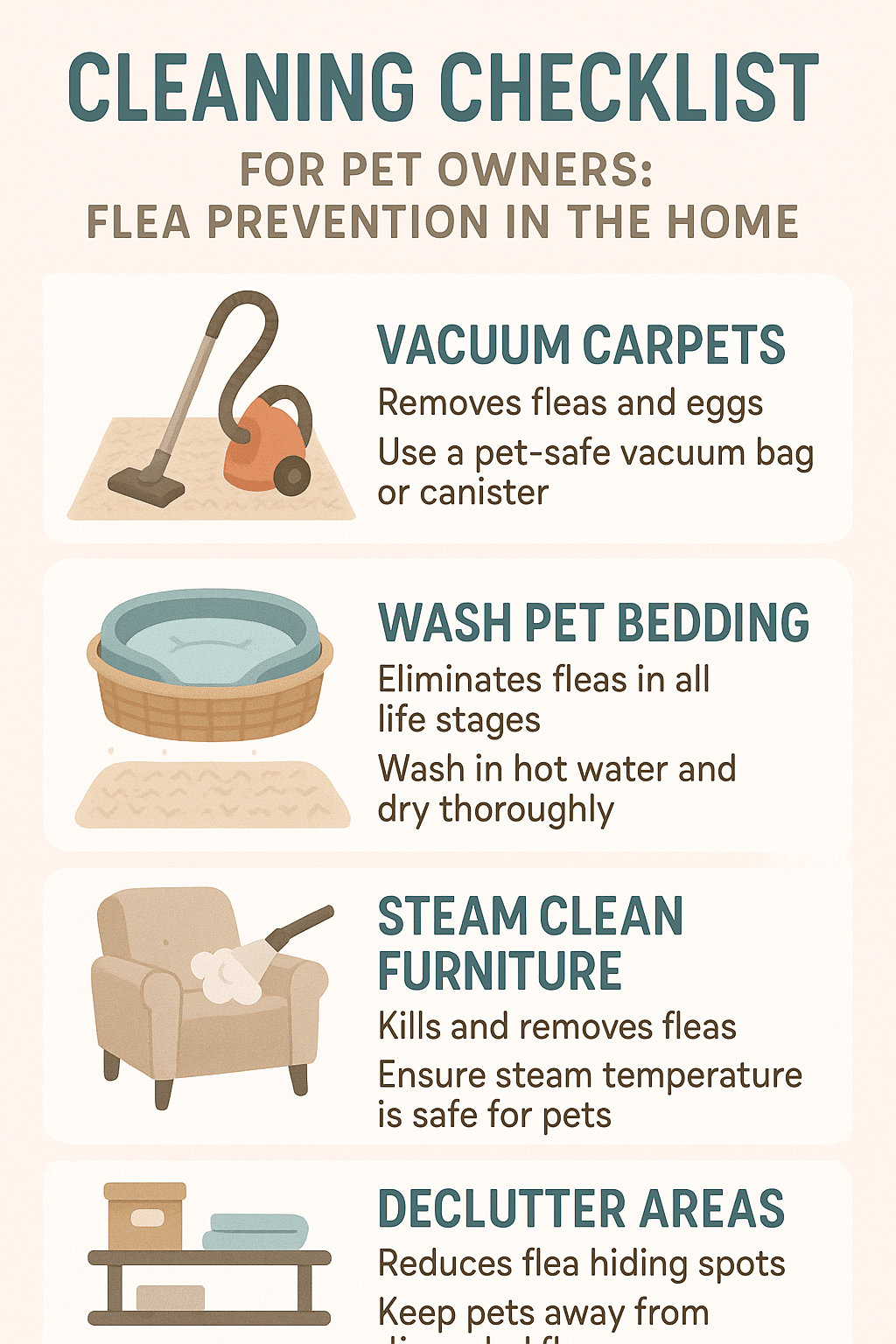
Yard Care: Nematodes, Yard Maintenance, and Flea-Repellent Plants
Fleas spend much of their life off your pet—in your yard’s soil, grass, and shaded areas. Introducing nematodes, microscopic beneficial worms, is a natural way to control flea larvae outdoors. Nematodes feed on flea larvae, breaking the cycle biologically without chemicals.
Regular yard maintenance also helps. Keep grass trimmed, remove leaf litter, and avoid excess moisture where fleas thrive. Planting flea-repelling herbs like lavender, rosemary, and mint around common pet areas provides a natural barrier that deters fleas.
Indoor Flea Prevention: Vacuuming, Homemade DIY Flea Traps, and Safe Cleaning
Indoors, frequent vacuuming of carpets, furniture, and pet bedding removes flea eggs and larvae before they hatch. Dispose of vacuum bags or contents outside promptly.
DIY flea traps—such as shallow dishes with soapy water placed near light sources—can attract and drown adult fleas. Using natural cleaning solutions with apple cider vinegar or lemon juice disinfects without harsh chemicals.
Applying diatomaceous earth inside after vacuuming adds a long-lasting layer of flea protection.
Homemade Natural Flea Remedies and Recipes for Pet Owners
DIY Lemon and Vinegar Flea Sprays
Ingredients:
- 1 lemon, sliced thin
- 2 cups water
- 1 cup apple cider vinegar
Instructions:
- Boil water and steep lemon slices for 30 minutes.
- Strain lemons, add apple cider vinegar, and mix well.
- Pour mixture into a spray bottle.
- Lightly mist your pet’s coat, avoiding eyes and mouth.
- Also spray pet bedding and carpets for added control.
Tips: Store in refrigerator for up to 7 days.
Salt and Baking Soda Treatments for Carpets and Upholstery
Sprinkle a mixture of equal parts salt and baking soda over carpets and furniture. Salt dehydrates fleas, while baking soda alters flea larvae pH, killing them. Leave for a few hours, then vacuum thoroughly.
Homemade Flea Shampoos Using Natural Ingredients
Mix gentle castile soap with a few drops of safe essential oils like lavender and cedarwood for a mild flea shampoo. Use warm water, lather your pet carefully, and rinse well. Always do a patch test for skin sensitivity.
Grooming Tools and Practices to Enhance Natural Flea Control
Benefits of Regular Flea Combing and Safe Bathing Practices
Using a fine-toothed flea comb daily removes adult fleas and flea dirt from your pet’s coat. This early action prevents fleas from multiplying.
Bathing your pet regularly with natural flea shampoos helps flush out and kill vulnerable fleas, especially when timed with flea hatching cycles.
Herbal Flea Collars and Natural Insect Repellents
Herbal flea collars infused with essential oils like peppermint and lemongrass provide continuous repellent action. Look for collars with natural ingredients to avoid chemical exposure.
Supplement with natural spray repellents for outdoor outings or heavy flea seasons.
Integrating Natural Flea Treatments into Your Pet Care Routine Safely
How to Test for Sensitivities and Avoid Toxic Ingredients
Begin any new natural treatment with a small skin patch test. Monitor your pet for redness, itching, or discomfort. If any adverse reactions occur, discontinue use immediately.
Educate yourself on essential oils or ingredients that may be toxic to your specific pet species (e.g., cats). Always follow product guidelines and consult your vet.
Combining Treatments to Break the Flea Life Cycle Effectively
Success comes from multi-pronged approaches: using pet-safe sprays, shampoos, flea combs, home cleaning, yard care, and environmental treatments simultaneously. This integrated method tackles eggs, larvae, pupae, and adult fleas at every stage.
Consistency is key—repeat applications timed with the flea life cycle (every 7–14 days) ensures thorough control and prevention.
When to Consult a Veterinarian: Managing Severe Infestations
If your pet shows signs of severe flea infestations, skin infections, anemia, or flea allergy dermatitis, or if natural treatments aren’t bringing relief, it’s crucial to seek veterinary help. Your vet can recommend appropriate medical flea control and supportive care. Early intervention prevents complications and keeps your pet comfortable.
FAQs about Natural Flea Treatments
Q1: Are natural flea treatments safe for all pets?
A1: Most natural flea treatments are safe for dogs and many cats, but some ingredients like certain essential oils can be toxic to cats. Always check product labels and consult your vet before use.
Q2: How long does it take for natural flea treatments to work?
A2: Natural treatments typically work gradually over days to weeks as they disrupt the flea lifecycle and environment. Consistent application over at least two flea generations (about one month) is recommended.
Q3: Can I use diatomaceous earth directly on my pet?
A3: Food-grade diatomaceous earth is safe to apply lightly on pets’ fur but avoid inhalation or contact with eyes and nose. Use as part of an integrated approach and always handle carefully.
Q4: How often should I apply natural flea sprays?
A4: Most natural sprays need to be reapplied every day or every few days, especially after your pet swims or baths, to maintain protection.
Q5: What plants can I grow to repel fleas in my yard?
A5: Flea-repelling plants include lavender, mint, rosemary, and chrysanthemum. These plants’ natural scents deter fleas and other pests when planted near pet areas.
Quick Takeaways/Key Points
- Fleas have a multi-stage life cycle requiring treatment of multiple environments including pets, home, and yard.
- Natural flea treatments are safer alternatives to chemicals but need consistent use.
- Key natural ingredients like diatomaceous earth, essential oils, apple cider vinegar, and herbal repellents are effective components.
- Top products like Wondercide Spray and Vet’s Best Shampoos combine natural oils for pet-safe flea control.
- Maintaining a flea-free environment with yard care, vacuuming, and DIY remedies supports natural treatments.
- Testing for pet sensitivities and consulting a vet are important for safe, effective flea management.
- Combining grooming practices and multiple treatments breaks the flea lifecycle for lasting relief.
Conclusion
Taking control of fleas naturally might seem daunting at first, but with the right knowledge and products, it’s both feasible and rewarding. I’ve found that embracing natural flea treatments not only keeps my pets safe from harsh chemicals but also empowers me to create a healthier home environment. The key is consistency and integrating flea management in your pet care routine—from carefully selected products like Wondercide Natural Flea & Tick Spray and food-grade diatomaceous earth to effective grooming and environmental control.
Remember, no single method works alone against these resilient pests. Combining natural shampoos, sprays, powders, home cleaning, and yard maintenance breaks the flea cycle effectively and gently. Don’t hesitate to ask your vet for advice if infestations persist or worsen. Above all, your commitment to your pets’ health and comfort will shine through as you keep those pesky fleas at bay without worry.
Ready to start protecting your pets naturally? Explore the natural flea treatments outlined here, and enjoy a flea-free, happy home for your furry companions!



